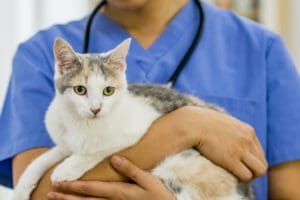No cat parent wants to see their precious feline throwing up, even when it is something as benign as a hairball. So, what do you do if your cat is throwing up but acting fine afterwards?
Typically, if your cat throws up but acts fine afterwards, there is nothing to worry about. This is especially true if it doesn’t happen that often and there are no other symptoms present. However, if your feline friend is regularly vomiting it may be time to bring them in for an examination. Learn more about the causes, and when to seek help, below.

Common Causes for Cat Vomiting
There are several reasons your cat may be throwing up but acting normally. In many cases, particularly if it is a single incident, the vomiting is not a reason for worry. However, if your cat is vomiting consistently and is demonstrating other symptoms of illness, it could be time to bring them to the vet. The following consists of some of the frequent triggers of feline vomiting:
Hairballs
Hairballs are a very common cause for a cat to vomit; most of the time, it is not significant. However, if your cat continuously gets hairballs, it can cause problems. If your cat accumulates too much of their hair in their stomach and cannot pass it through their stool, it can cause an obstruction inside their intestines.
It not only results in your cat throwing up, but it can also cause abdominal pain and fluid and electrolyte imbalances if it is not treated right away. If you see any signs that your cat may be experiencing an obstruction, you need to get them to the emergency vet, as surgery may be required to correct the intestinal blockage.
You can also help prevent hairballs by brushing your cat daily. It can be a bonding encounter for both of you. There are also special foods that contain hairball remedies or treat you can spoil them with that is anti-hairball.
Food Indiscretion or Diet
If your feline is throwing up after eating their meals, they may be experiencing a stomach issue due to the food they are eating. Any time there is a change in food, you want to introduce it slowly and give your cat ample time to get acclimated to it.
If you try giving them time to adjust and they are still not responding well, you may want to return to the original food. If you have an outdoor cat, they may have hunted another animal that made them sick, like a rodent carrying disease. Indoor cats can also get a hold of mice, but it is not as prevalent. To be on the safe side, give your feline companion a fake mouse to hunt and keep indoors.
Eating Too Quickly or Too Much
If your cat eats too quickly or too much, it can make them nauseous. Many felines get enthusiastic about mealtime and inhale their food, which can lead to retching. You may want to invest in food puzzles or a slow feeder, which will control the pace at which your eager feline consumes their food. Limit your cat’s access to dry food so they do not graze too long or overeat.
Food Allergies
Just like people, cats can be allergic to certain foods. A cat’s most common food allergies involve beef, fish, poultry, and dairy. They may also be allergic to soy and eggs. Some of the indicators linked with food allergies include:
- Skin inflammation
- Skin and ear infections
- Diarrhea and vomiting
- Poor coat condition
- Sneezing or coughing
- Runny eyes or nose
Cats with allergies often experience chronic itching of the skin and inflammation. A cat will become so itchy and uncomfortable that they overgroom themselves, which causes them to lose their fur. If your cat has food allergies, they will need to eat a special food comprised of hydrolyzed proteins and single carbohydrate sources.
Chronic Stress
If your cat is vomiting a lot, and there have been recent changes such as a big move or a death in the family, they may be chronically stressed. You can help your cat de-stress with particular products, like calming pheromone spray or calming treats. Some of the cautionary signs of chronic stress in a feline are:
- Urinating outside the litterbox
- Eating less or more than usual
- Hiding more than usual
- Vomiting or diarrhea
- Overgrooming
- Aggression
Calming pheromone spray mimics your cat’s natural pheromones, and when they are released, they make your cat feel safe. Calming treats contain natural amino acids to help lessen your cat’s anxiety. If your cat shows any of the above warning signs, talk to your vet about trying one of these products.
There may also be physical markers that your cat is stressed, such as bad coat condition. If your cat’s overgrooming to the point of them having bald patches, they may be suffering from chronic stress.
More Serious Causes of Vomiting in Cats

Your responsibility as a pet parent is to notice any physical symptoms that may signify something is wrong. If your cat only throws up once or twice a month, it is mostly not a source for concern. However, if it occurs often, and you see any unusual symptoms, you should take them to the vet immediately. There may be a more serious underlying health issue arising:
Inflammatory Bowel Disorder
Inflammatory bowel illness in felines is a chronic condition with inflammation in the gut and can be triggered by autoimmune problems. A bacterial infection can also occur due to a blockage or a parasitic infection from worms or parasites. Symptoms of inflammatory bowel disease in cats include:
- Diarrhea or vomiting
- Lack of energy
- Poor appetite
- Weight loss
It is important to note that if the stomach is involved in the illness, your cat will typically experience chronic vomiting. However, if the intestines are affected, chronic diarrhea will likely occur. Sometimes the stomach and intestines will trigger both simultaneously.
There is a difference between irritable bowel syndrome and inflammatory bowel disease in cats. Irritable bowel syndrome is severe and abrupt inflammation of the gastrointestinal tract, and inflammatory bowel disease is chronic inflammation in the lining of the intestines. Take your feline to the vet if you see these warning signs.
Toxins or Chemicals
When a cat has ingested a toxic chemical or dangerous substance, you must act fast to get them the help they need. Toxins or harmful chemicals could be anything from poisonous plants or flowers, medications, insecticides, or some human foods such as chocolate, grapes, or raisins. Some of the typical indicators that your feline may have consumed a toxic ingredient are:
- Vomiting or diarrhea
- Difficulty breathing
- Excessive salivation
- Elevated heart rate
- Incoordination
- Seizures
- Anemia
- Fever
If you suspect your cat has consumed a toxin or poison, you need to get them to the emergency vet immediately, as there is no time to waste. The sooner your feline gets medical care, the more likely there will be a certain outcome. You do not want to allow that poison to propagate all through the body.
Conclusion
There are many potential reasons why your cat is throwing up, but most of the time, it is not serious. However, if you see any concerning symptoms, get them to the vet immediately.
Are you looking for a veterinarian in the Manhattan, NY and Brooklyn, NY area? Heart of Chelsea Veterinary Group has four locations conveniently located and ready to serve you. To make an appointment, visit our website today!
Recent Posts
About Us
Heart of Chelsea Veterinary Group is more than an animal hospital; we are your partner in giving your pet a lifetime of outstanding care. Our veterinarians and team members form lasting relationships with pet owners like you to create unique, personalized experiences for all. Heart of Chelsea was founded in 1999 to provide the community with a neighborhood veterinary practice that delivers thorough, compassionate medicine and unparalleled concierge client service.

